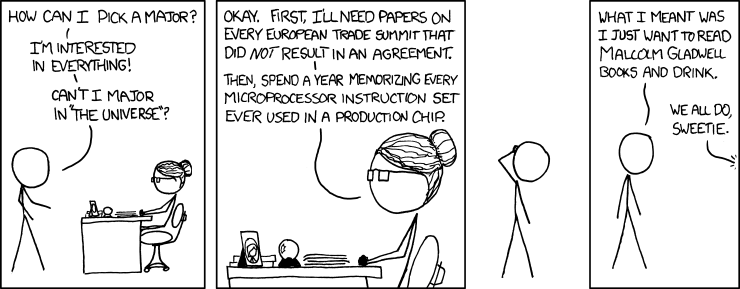Archive for February, 2011
February 22, 2011 @ 11:04 am· Filed by Ben Zimmer under Announcements, Linguistics in the news, The academic scene
The second issue of Popular Linguistics Magazine, a new online venture edited by DS Bigham, has hit the intertubes. The first thing readers may notice in the February issue is that complaints about the site's inverted color scheme (many voiced in the comments here) have been taken to heart: the magazine is now displayed with the familiar design of black text on a white background. As for content, Black History Month brings an interesting trio of articles: "The Diversity of English in America" by Simanique Moody, "The Mysteries of the N-Word" by Janet M. Fuller, and "Word on the Street: Blogging on African American English" by Renee Blake & Cara Shousterman (the last one reporting on the student-run blog, Word: The Online Journal on African American English). And there are various other lagniappes, including the editor's suggestions for enriching English snow-cabulary. Table of contents is here.
Permalink
February 22, 2011 @ 10:22 am· Filed by Mark Liberman under Language and politics
Jacob Weisberg, who turned the Bushisms industry into a nice source of income for six years or so, must be even more excited than Rupert Murdoch about the possibility that Sarah Palin will make a serious run for president in 2012. Weisberg's Palinisms feature at Slate has already notched 71 little items, and the first Palinisms book has already been published, with a full line of calendars and other paraphernalia no doubt waiting in the wings.
And as in the case of Weisberg's Bushisms, what starts as communal amusement at perceived gaucheries ("He said Kosovians!") quickly leads to sniggering at favored expressions, at regionalisms, at routine slips of the tongue, and sometimes at nothing that those not in the giggling in-crowd can perceive at all.
Read the rest of this entry »
Permalink
February 21, 2011 @ 8:02 pm· Filed by Bill Poser under Humor
This report that French is a hoax is too funny not to pass on.
Permalink
February 21, 2011 @ 11:17 am· Filed by Mark Liberman under Language and politics
Lameen Souag at Jabal al-Lughat discusses "Gaddafi Jr's speech":
In his rather desperate speech today, Saif Al Islam Gaddafi opened with a sociolinguistically very interesting statement:
əlyōm saatakallam maʕākum… bidūn waraqa maktūba, 'aw xiṭāb maktūb. 'aw natakallam maʕakum bi… luɣa ħattā ʕarabiyya fuṣħa. əlyōm saatakallam maʕakum bilahža lībiyya. wa-sa'uxāṭibkum mubāšaratan, ka-fard min 'afrād hāða ššaʕb əllībi. wa-sa'akūn irtižāliyyan fī kalimatī. wa-ħattā l'afkār wa-nniqāṭ ɣeyr mujahhaza u-muʕadda musbaqan. liʔanna hāðā ħadīθ min alqalb wa-lʕaql. (YouTube – first minute; conspicuously dialectal bits bolded)
Today I will speak with you… without a written paper, or a written speech. (N)or even speak to you in the Classical (fuṣħā) Arabic language. Today I will speak with you in Libyan dialect, and address you directly, as an individual member of this Libyan people. And I will speak extempore. Even the ideas and the points are not prepared in advance. Because this is a speech from the heart and the mind.
Read the whole thing.
Permalink
February 21, 2011 @ 10:48 am· Filed by Mark Liberman under The academic scene
The latest xkcd:

Mouseover title: "I hear Steven Levitt is writing a book analyzing A.J. Jacobs' quest to spend a year reading everything Malcolm Gladwell ever wrote. The audiobook will be narrated by Robert Krulwich of Radiolab."
(As usual, click on the image for a larger version.)
Read the rest of this entry »
Permalink
February 21, 2011 @ 9:24 am· Filed by Mark Liberman under Variation
Helen DeWitt writes with a question about "afterward(s)" and "backward(s)":
I've had comments back from my editor on a book that is to come out in late October. He mentioned that when he started going through the document he changed "afterwards" to "afterward" and "backwards" to "backward" but later stopped, so the words could be left as they stood. It might, he thought, be better to be consistent (the text was not entirely consistent).
Read the rest of this entry »
Permalink
February 21, 2011 @ 12:38 am· Filed by Eric Baković under Language and the media, Morphology, Pronunciation, Variation, Words words words
The word protesters has for obvious reasons jumped into abnormally high-rotation on the news radio dial, and to my surprise, many of the members of the media (on NPR and the BBC) that I've heard use the word are pronouncing it protésters [pʰɹəˈtʰɛstɚz] rather than the way I would pronounce it, prótesters [ˈpʰɹoʊˌtʰɛstɚz]. (Please ignore the r-coloring I've indicated on the last vowel, which reflects my r-ful pronunciation; it's the difference in stress that I'm interested in.) I think I've pinpointed both the justification for pronouncing what I'll arbitrarily call "the media's way" and why I pronounce it my way; read on below the fold if you're interested, and let us know what you think in the comments.
Read the rest of this entry »
Permalink
February 20, 2011 @ 4:31 pm· Filed by Geoffrey K. Pullum under Language and technology, negation
From a Livescience.com article (about a police chief who recommends keystroke-logging your kids to obtain their passwords so you can find out where they go online) comes this disastrous tangle of a sentence, which will take hours of police time to clear up:
"When it comes down to safety and welfare of your child, I don’t think any parent would sacrifice anything to make sure nothing happens to their children," said Batelli, the father of a teenage daughter.
Read the rest of this entry »
Permalink
February 20, 2011 @ 7:44 am· Filed by Victor Mair under Lost in translation
The South China Morning Post (Feb. 13, 2011) carried this peculiar headline for an article by John Carney: "No sex please, our ancestors are resting, sign says." And here is a photograph of the sign in question:

The sign is situated in a remote location in Clear Water Bay, Hong Kong. But what in the world does it mean?
Read the rest of this entry »
Permalink
February 20, 2011 @ 5:30 am· Filed by David Beaver under Evolution of language, Language and the media, Pragmatics, Semantics, Words words words
 In this week's online BBC News magazine, Alan Metcalf reprises his recent book OK: The Improbable Story of America's Greatest Word. I haven't read the book, but Prof. Metcalf is an established scholar as well as a successful popularist, and I have every reason to think that the book is well worth reading. Still, I have a little semantic problem with the article.
In this week's online BBC News magazine, Alan Metcalf reprises his recent book OK: The Improbable Story of America's Greatest Word. I haven't read the book, but Prof. Metcalf is an established scholar as well as a successful popularist, and I have every reason to think that the book is well worth reading. Still, I have a little semantic problem with the article.
The article mostly discusses the history of OK, saying that its widespread circulation probably dates back to an unfunny joke in an 1839 article in the Boston Morning Post. Fair enough: he and the OED agree on this point. Then he goes on:
But what makes OK so useful that we incorporate it into so many conversations?
Read the rest of this entry »
Permalink
February 19, 2011 @ 12:28 pm· Filed by Mark Liberman under Multilingualism, Psychology of language
Yesterday afternoon, here at AAAS-2011, I attended a superb symposium: "Crossing Borders in Language Science: What Bilinguals Tell Us About Mind and Brain". Here's the abstract:
More people in the world are bilingual than monolingual. Historically, the component disciplines that comprise the language sciences have focused almost exclusively on monolingual speakers of a single language and largely on English as the universal language. In the past decade, there has been a shift in these disciplines to acknowledge the consequences of bilingualism for characterizing language, understanding the way languages are learned and used, and identifying the consequences of negotiating life in two languages for cognitive and brain processes. Recent studies show that bilingualism confers advantages to cognitive control at all stages of life, from infancy to old age; that contrary to popular belief, being exposed to two languages from early childhood does not create confusion but instead modulates the trajectory of language development; that signed and spoken languages produce a form of bilingualism that is similar to bilingualism in two spoken languages; and that the continual activity of both languages affects brain function and structure. Despite the excitement surrounding these discoveries, we do not understand how exposure to and use of two languages creates the observed consequences for bilingual minds and brains. Addressing these questions requires a language science that is both cross-disciplinary and international. The aim of this symposium is to illustrate the most exciting of these new discoveries and to begin to consider their causal basis.
Read the rest of this entry »
Permalink
February 18, 2011 @ 6:05 am· Filed by Mark Liberman under The language of science
I'm at the AAAS 2011 meeting in DC, mainly because as chair-elect of Section Z (Linguistics) I'm duty-bound to be here, but also partly because I'm giving a talk in a symposium tomorrow afternoon on "The Digitization of Science: Reproducibility and Interdisciplinary Knowledge Transfer". The session was organized by Victoria Stodden, and this is its abstract:
Scientific computation is emerging as absolutely central to the scientific method, but the prevalence of very relaxed practices is leading to a credibility crisis affecting many scientific fields. It is impossible to verify most of the results that computational scientists present at conferences and in papers today. Reproducible computational research, in which all details of computations — code and data — are made conveniently available to others, is a necessary response to this crisis. This session addresses reproducible research from three critical vantage points: the consequences of reliance on unverified code and results as a basis for clinical drug trials; groundbreaking new software tools for facilitating reproducible research and pioneered in a bioinformatics setting; and new survey results elucidating barriers scientists face in the practice of open science as well as proposed policy solutions designed to encourage open data and code sharing. A rapid transition is now under way — visible particularly over the past two decades — that will finish with computation as absolutely central to scientific enterprise, cutting across disciplinary boundaries and international borders and offering a new opportunity to share knowledge widely.
Read the rest of this entry »
Permalink
February 17, 2011 @ 6:46 pm· Filed by Mark Liberman under Syntax
Neil MacFarquhar, "Unrest Spreads, Some Violently, in Middle East", NYT 2/17/2011:
From northern Africa to the Persian Gulf, governments appeared to flounder over just how to outrun mostly peaceful movements, spreading erratically like lava erupting from a volcano, with no predictable end.
The protests convulsed countries across the Middle East on Thursday , with riot police launching a sudden crackdown on thousands of people challenging the monarchy in Bahrain, firing shot guns, tear gas and concussion grenades into a tent camp to send demonstrators fleeing under clouds of stinging fumes. At least five people were reported killed.
Read the rest of this entry »
Permalink


 In this week's online BBC News magazine, Alan Metcalf
In this week's online BBC News magazine, Alan Metcalf